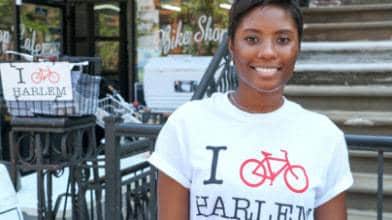
For decades, many travelers to New York City have limited their excursions to Manhattan neighborhoods south of Central Park. Moreover, those who do choose to go beyond the traditional tourist hotspots often see neighborhoods like Harlem—my home for nine years—from the top floor of a tour bus.
This experience cannot possibly impart the “real” Harlem—a vibrant and historic community with world-class cuisine, soulful music and a rich artistic scene that continues to breathe new life into an area whose cultural exports have been changing the world for over a hundred years.
I want visitors to see the Harlem I know up close, not from behind the plexiglass of a tour bus window. My business, “I Bike Harlem,” gives travelers the opportunity to discover our handsome brownstones and vibrant small businesses. It’s a business I am incredibly proud of and it’s a business that would not exist were it not for the economic opportunity provided by Airbnb.
I began sharing my home on Airbnb as a way to earn a little extra money while starting I Bike Harlem. Through Airbnb, I was able to raise the funds I needed to start my business—investing in the bicycles, helmets, storage, and insurance that brought it from an idea on paper to reality. Now, my business is growing — with customers from all around the world including right here in Harlem. In fact, many of my customers are Airbnb guests. In that way, I am part of an “Airbnb business cycle”: I started my company with income earned as an Airbnb host, and in turn, Airbnb guests have helped my business grow and thrive.
Our elected officials often talk about fostering a “startup” culture in New York City, with millions of dollars invested in tech campuses, incubators, and tax credits throughout the Empire State. Important as these investments are, the truth is that our public policy must recognize that entrepreneurship and the economic activity it generates, comes in many different forms, now more than ever.
For example, I cannot count on an angel investments or incubators to help my business grow. Rather than relying on “startup” culture, my business is grounded in Harlem’s culture and the desire of travelers to experience a new place from a local’s perspective. And the investors who helped my business get off the ground aren’t venture capitalists; they are everyday people who chose to stay with me on Airbnb.
Hosting on Airbnb gave me the opportunity to start my business. And guests on Airbnb helped build my business. Now, Airbnb has launched a new tool that will take my business to the next level.
Dubbed “Airbnb: Experiences,” this new service allows visitors to partake in offerings of hundreds of local entrepreneurs—everything from a multiple-day dance immersion to a tour of local pubs. I am proud to be an “Experience” host, bringing the Harlem I know and love within reach of millions of Airbnb travelers.
In addition, Airbnb helps visitors identify and patronize authentic local businesses by publishing neighborhood guidebooks and partnering with local business associations, such as the Harlem Business Alliance, to hold “Small Business Socials” and “Merchant Walks.”
The impact of these initiatives are two-fold: saving businesses money otherwise spent on marketing, while drawing visitors to neighborhood businesses off-the-beaten-path.
In fact, 76 percent of restaurants in guidebooks appear outside of traditional hotel districts. With these services, it’s no wonder that Airbnb guests spent $470 million at NYC restaurants in the year ending September 1, 2016, and more than $1.5 billion in restaurants over the same period in America’s 19 largest cities.
Airbnb is more than just a short-term rental website, it is a dynamic platform that is proving to be an engine of economic opportunity. It helps neighborhoods that have long been ignored by the traditional tourism industry, brings in new customers to local shops, and gives New Yorkers like me the chance to forge a new livelihood by sharing my home and building my business.
